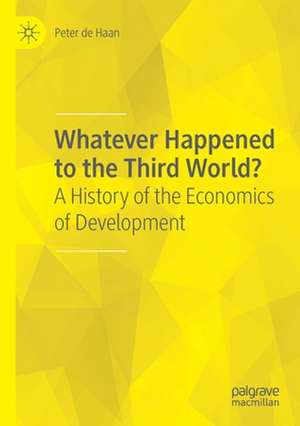Whatever Happened to the Third World?: A History of the Economics of Development
Autor Peter de Haanen Limba Engleză Paperback – 30 iun 2021
How can the successful development of some former Third World countries be explained, while other developing countries have remained stagnant or worse, have deteriorated into failed states? This book offers a history of the economics of development. De Haan examines how the right mix of policies and evolving insights in development economics have impacted certain countries with the progression from low-income to middle-income, and even high-income status. In particular middle-income countries encounter hindrances to transit into high-income countries. The challenges of low-income countries and those of fragile and failed states is elaborated as well.
Due attention is given to successive generations of development economists, economic growth models and international trade theories to provide academic background to the evolution or stagnation of developing countries. The author’s own experience in development aid is woven into the text, making this book important and entertaining reading for researchers, students of development economics, international trade and international aid.
Due attention is given to successive generations of development economists, economic growth models and international trade theories to provide academic background to the evolution or stagnation of developing countries. The author’s own experience in development aid is woven into the text, making this book important and entertaining reading for researchers, students of development economics, international trade and international aid.
| Toate formatele și edițiile | Preț | Express |
|---|---|---|
| Paperback (1) | 641.71 lei 6-8 săpt. | |
| Springer International Publishing – 30 iun 2021 | 641.71 lei 6-8 săpt. | |
| Hardback (1) | 647.08 lei 6-8 săpt. | |
| Springer International Publishing – 30 iun 2020 | 647.08 lei 6-8 săpt. |
Preț: 641.71 lei
Preț vechi: 754.95 lei
-15% Nou
Puncte Express: 963
Preț estimativ în valută:
122.81€ • 127.74$ • 101.38£
122.81€ • 127.74$ • 101.38£
Carte tipărită la comandă
Livrare economică 15-29 aprilie
Preluare comenzi: 021 569.72.76
Specificații
ISBN-13: 9783030396152
ISBN-10: 3030396150
Pagini: 324
Ilustrații: XIX, 324 p. 2 illus.
Dimensiuni: 148 x 210 mm
Greutate: 0.45 kg
Ediția:1st ed. 2020
Editura: Springer International Publishing
Colecția Palgrave Macmillan
Locul publicării:Cham, Switzerland
ISBN-10: 3030396150
Pagini: 324
Ilustrații: XIX, 324 p. 2 illus.
Dimensiuni: 148 x 210 mm
Greutate: 0.45 kg
Ediția:1st ed. 2020
Editura: Springer International Publishing
Colecția Palgrave Macmillan
Locul publicării:Cham, Switzerland
Cuprins
Chapter 1: Introduction.- Chapter 2: Whatever happened to the Third World.- Chapter 3: What preceded development economics.- Chapter 4: The first generation of development economists.- Chapter 5: The second generation of development economists.- Chapter 6: Main components of the third generation.- Chapter 7: trade, globalisation and development.
Notă biografică
Peter de Haan has worked for forty years in development. First as a Junior Professional Officer at the Pacific Regional Office of the United Nations Development Programme, after which he was appointed Asia Bureau Chief at the Dutch Non-Governmental Organisation NOVIB (now merged with Oxfam). Subsequently, he briefly managed the European Office of Inter Press Service, a Third World news agency. De Haan was then appointed Senior Institutional Development Advisor at the Netherlands Ministry for Development Cooperation, followed by his postings at the Netherlands’ Embassy in La Paz, Bolivia, and – subsequently - Lusaka, Zambia. He has written various books about development and economics; the latest one being From Keynes to Piketty: The Century that Shook up Economics, published in 2016 by Palgrave Macmillan. De Haan is a member of the Royal Netherlands Economic Association and the Bolivian Academy of Economic Science.
Textul de pe ultima copertă
How can the successful development of some former Third World countries be explained, while other developing countries have remained stagnant or worse, have deteriorated into failed states? This book offers a history of thought perspective on development economics and an assessment of development aid and cooperation. De Haan examines how the right mix of policies and evolving insights in development economics have impacted certain countries with the progression from low-income to middle-income, while it is still difficult to shift from the middle-income to higher-middle income stage.
Does foreign aid work? Due attention is given to aid philosophies since the end of WW2 and how (in)effective the implementation of such philosophies have been. With case studies drawn from the author's own 40 years' experience in development aid, this book is important reading for researchers and students of development economics, development studies, international trade and foreignaid.
Caracteristici
Interweaves the author's personal experience in working in developing countries Succinctly explains the evolution in thinking about topics such as economic growth models, international trade theory, the dirigiste dogma, Hirschman’s dissenting views, and Myrdal’s circular cumulative causation Touches upon contemporary issues such as the trade war between the US and China and the latest Sustainable Development Goals and population issues Includes an overview of the first generation of development economists and beyond, development theories in the Marxist tradition, and views of contemporary commentators such as Edward Luce and Bruno Macaes
